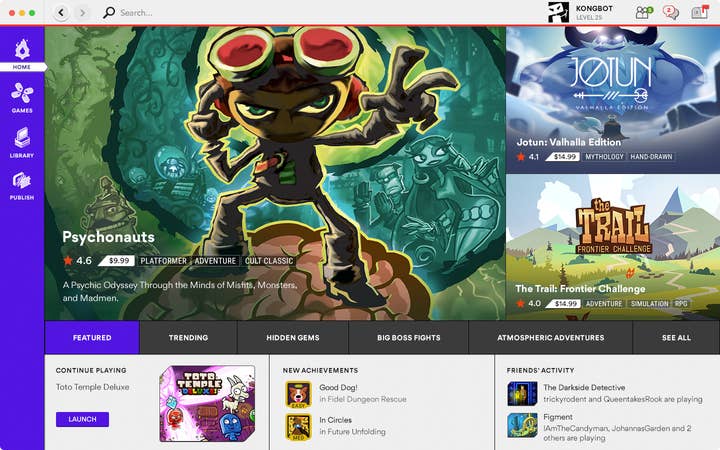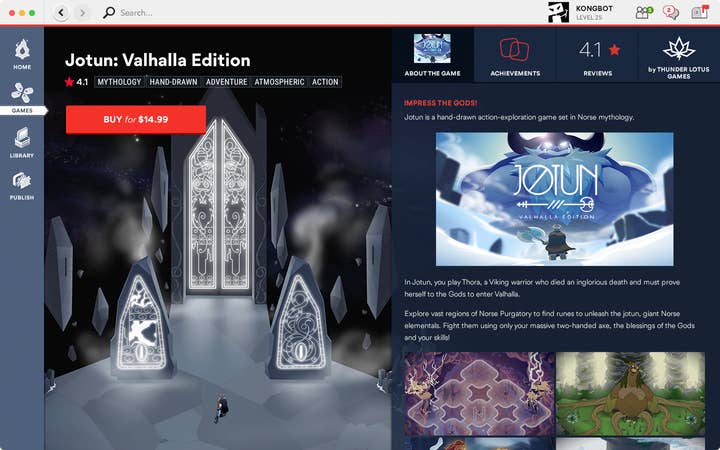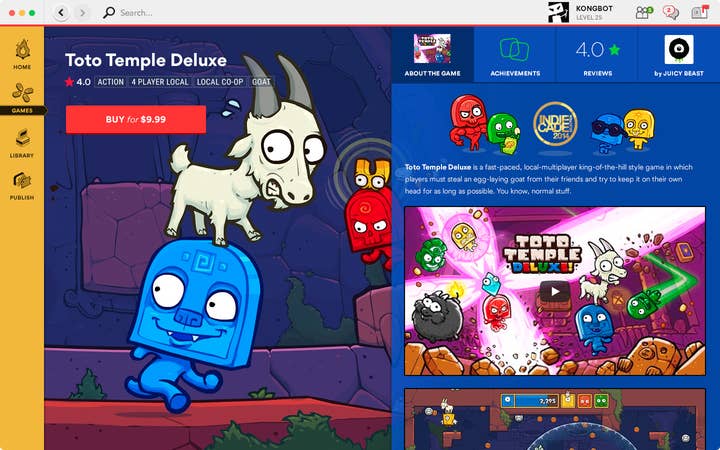How Kongregate plans to rival Steam with new store Kartridge
“Everybody uses Steam, but they don't necessarily love it,” says CEO Emily Greer
It takes a bold plan and a lot of ambition to enter a market that has been dominated by a single player for more than a decade - and that's what Kongregate is attempting to do.
Earlier this month the firm announced Kartridge, a new downloadable games store that will offer a range of premium, free-to-play and pay-what-you-want titles when it launches this summer. Kongregate hopes to attract developers of all sizes by offering complete control over pricing, the ability to create your own store pages, and the promise of no upload fees.
The company believes Kartridge can fill a gap in the market - although it's a little hard to see where that gap might be. Ever without the overbearing presence of Steam, the market leader by more than a healthy margin, there are other stores contending for PC gamers' attention, such as GOG, Microsoft's Window Store, EA Origin and Ubisoft's Uplay.

"There's no question that it's a difficult market, and one where there are already a lot of players," Kongregate CEO Emily Greer admits to GamesIndustry.biz. "But just because there are already a lot of players doesn't mean that there isn't space for something else. A lot of times when you're used to using something, you don't realise you'd actually like something else better. It can feel like there's no room in the market, but we feel there is."
Greer stresses that Kartridge will, to begin with, focus on smaller and independent developers in order to build a catalogue that's a little different from the larger stores. She also says the company plans to build on "the delight of the experience". In fact, she goes as far to say she "probably wouldn't describe Kartridge as a storefront."
"Kartridge will be a place where you come to find games and it will hopefully be part of your social experience, connecting you to other players and friends," she says. "We'll have achievements and want the platform itself to feel like a game, which is something we were able to do on Kongregate. We want to take that a step further.
She continues: "There are a lot of storefronts out there, but they are just storefronts, they're not experiences. Steam has a lot of depth in terms of collectibles and other things. But talking to developers, and even a lot of players, everybody uses Steam but they don't necessarily love Steam. Steam isn't for everybody."
"A lot of times when you're used to using something, you don't realise you'd actually like something else better. It can feel like there's no room in the market, but we feel there is"
Any lack of love for Valve certainly doesn't show when it comes to Steam's market share. The store has long since been established as the go-to destination for games on PC and, as Greer observes, "in many ways they helped make [that] market". Even Kongregate has several games from its publishing business available on Steam.
Nevertheless, there does seem to be this begrudging acceptance of Valve's dominance among developers, one littered with disappointment in everything from the sheer volume of games it offers (thus significantly impacting the potential for discovery) to the toxic behaviour of some of its users.
With such a mixed atmosphere surrounding Steam, is the industry ready to welcome another contender?
"Yes, we think so," says Greer. "And certainly, the response we've got from developers has been a tremendous enthusiam for that possibility - especially around the idea of curation and just having a separate storefront.
"Just having more storefronts automatically would help discovery. There used to be a thousand Flash portals, and there might not have been great discovery on any particular one of those, but because players would go to different sites, they would find different games."

Of course, the lack of upload fees means there is nothing to stop Kartridge from becoming flooded with a similar volume of titles to Steam - but Greer is confident Kongregate has the experience required to handle this.
"We're used to dealing with the various extremes of people creating content from the ten years of building Kongregate.com," she explains. "On that site, there are definitely 13-year-olds making their first game but we also have games from EA, Ubisoft and Supercell. We worked a lot on our curation and discovery because we were getting 1,000 to 1,200 games per month - we now have 120,000 games so we worked a lot on our systems to show the right games to people and help them uncover hidden gems. We worked with developers that we don't know as well as the ones that we do."
"Talking to developers, and even a lot of players, everybody uses Steam but they don't necessarily love Steam. Steam isn't for everybody"
The company's history with Flash games also adds to this skill in handling vast volumes of new releases, with Greer reporting that there were years where Kongregate had more than 15,000 games uploaded. This was in part because Flash games are comparitively easy to make and upload, but with the barrier to entry for larger games development practically gone thanks to the likes of Unity and Unreal, it's a problem unlikely to go anywhere.
"It is a challenge, and not every game is going to surface and get sold," says Greer. "There is a finite amount of attention from consumers - but then, let's be honest, not every game is good either. There are a lot of games that are part of the learning experience of making games. What we hope to do is make sure that each game gets the minimum level of audience, we want to make sure we don't lose any hidden gems."
Much of Kartridge will be built on learnings from Kongregate.com. That site compelled the company to constantly monitor game ratings, play patterns and offer incentives to push players to try unrated games in order to generate feedback. However, Greer says the firm is also working on some new techniques to aid discoverability - although she's not able to discuss them publicly yet.
"Just having more storefronts automatically would help discovery. There used to be a thousand Flash portals... because players would go to different sites, they would find different games"
Discoverability is by no means a PC-only problem, with Greer pointing to similar issues on Android and iOS.
"They have similarly huge stores, bigger than Steam's, but Android and Google has put a lot of effort into customised recommendations and trying different approaches to how you surface games," she says. "We see a sustained lift in organic installs, not for every game but generally the highest quality games from that approach."
Apple, in particular, has been experimenting at surfacing the best games through its overhauled App Store, which offers editorial recommendations through the Today section and dedicated Games tab. Greer reveals Kartridge will be doing something similar with an editorial team already in place.

While Greer observes that "algorithms only take you so far", she believes a balance of editorial and automated curation is important to giving developers the best chance at getting their games discovered. The key is not to rely on either system, and constantly try new approaches.
"Discovery is not binary. It doesn't come down to just being on the homepage or in the charts. We want to surface games in a number of different ways so that there's a chance of success"
"There will be pods [on the homepage] that will make recommendations based on things you've purchased or liked before, there will be editorial-type recommendations of what's new and what we're excited about, there will be lists of different types of games," she says of Kartridge's various systems. "And that will be throughout the platform, on individual game pages and not just the homepage. We'll take a lot of different slices.
"Discovery is not binary. It doesn't come down to just being on the homepage or in the charts. We want to surface games in a number of different ways so that there's a chance of success - even when you're not squarely in the centre because the homepage is always going to be limited real-estate."
Crucial to this effort are the customisable developer pages, which Greer describes as "somewhere in-between Steam and Itch.io". By this she means they will be more flexible to studios' needs than Steam's pages - where Valve's chosen store colours often dominate and information is displayed in a set template - but more organised than those on Itch - where the amount of customisation developers are able to do means players "don't necessarily know where the buy button is."
"One of the important things developers can do for themselves, especially smaller developers, is build their brand and build their audience," Greer says. "You see that a lot in terms of Twitter followers, and email lists. We think it's really important for developers that their name and their identity is highlighted in the store, and that they can connect directly with players to show off their other work.
"We're going to do our best to help games get discovered, but in terms of building a business and a brand it's very important that developers help build that themselves. We're trying to give them the tools to do that."
Another complaint against Steam is the toxicity among some corners of its userbase. GamesIndustry.biz has touched on this before - in fact, it prompted our North American editor to abandon the platform entirely.
"We have to be somewhat realistic: only so many people are going to succeed. We just want to make it a fair shot for more developers and make it an overall better experience"
Greer offers the example of recent articles indicating Steam is home to groups of users that celebrate school shootings - particularly contentious in the wake of last month's shooting at a school in Parkland, Florida that left 17 dead. Kongregate is determined that this will not be repeated on Kartridge or any of its other sites.
"After every major shooting in the US, we'll get trolls who register names [on Kongregate] under the identity of whoever the shooter was, just as a subtle way to bring that presence up," Greer explains. "But our community team knows that and makes sure they look for and ban those accounts or force name changes on them so we don't have that sort of low-level [toxic] behaviour there. For Kartridge we're looking to take moderation up another notch from where it's been on Kongregate, including things like algorithmic chat moderation and bringing more moderators in. We've always had a stronger point of view on moderation than many other sites and that's something we're continuing to build on.
"Our community team is run by a former social worker who, in her 40s, was an avid Kongregate player and we hired her out of the community. She has a real passion for taking something that is troubling and [resolving it] and that's what we'll be doing on Kartridge."

Greer elaborates that while she refers to algorithmic chat moderation, its role is primarily to flag up things for a human community team to investigate. Kongregate.com already calls on the services of volunteer moderators and this is expected to continue with Kartridge, as is the ongoing work into ensuring better reporting tools for all users.
Regardless of whether Kongregate can actually supplant Steam, the company is determined that Kartridge will become a viable marketplace for developers to sell their games, offering an important alternative when these studios are drowned out by the noise of Valve's cluttered catalogue.
Of course, the company cannot guarantee to always put "the right game in front of the right player at the right time", as it hopes to do, but it promises to keep trying - particularly given how hard developers struggle to get their games noticed.
"If you look at everyone who's a musician, not everyone is going to get a big stage or be able to do that professionally," Greer says. "When you have an industry driven by passion and love, you're always going to get some sort of imbalance in terms of everybody who wants to make the content and how many can realistically build a business around it.
"We have to be somewhat realistic: only so many people are going to succeed. We just want to make it a fair shot for more developers and make it an overall better experience."
